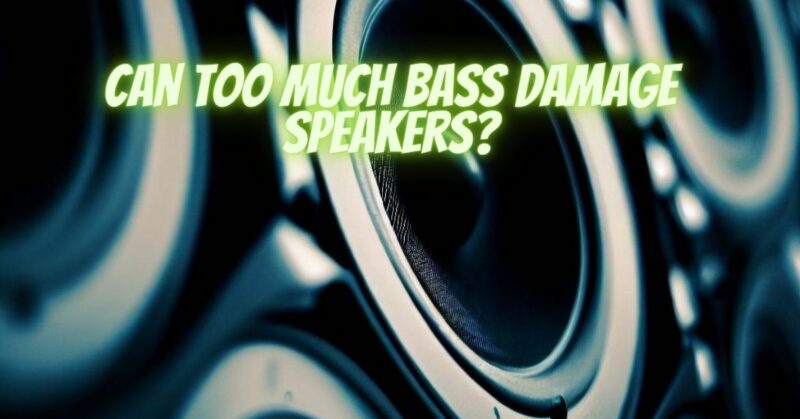Bass is a fundamental component of audio reproduction, adding depth and impact to music and movies. However, the question arises: can too much bass damage speakers? In this article, we will delve into the effects of excessive bass on speakers and provide insights into maintaining a balanced and safe listening experience.
Understanding the Speaker’s Limits: To comprehend the potential risks, it’s crucial to understand the design and limitations of speakers. Speakers consist of various components, including the cone, voice coil, and suspension system. These components are engineered to handle a specific range of frequencies and power levels. Pushing speakers beyond their intended capabilities can lead to detrimental consequences.
Effects of Excessive Bass on Speakers:
- Overexcursion: Excessive bass can cause the speaker cone to move excessively, resulting in overexcursion. When the cone moves too far, it can exceed its physical limits, leading to distortion, loss of clarity, and, in extreme cases, mechanical failure. Continuous overexcursion can cause permanent damage to the speaker’s suspension and voice coil.
- Voice Coil Overheating: Bass-heavy content, particularly with extended low-frequency tones, can demand significant power from the amplifier. If the amplifier is driven beyond its limits or if the bass frequencies are amplified disproportionately, the voice coil in the speaker can overheat. Excessive heat can damage the voice coil’s insulation, affecting its performance and potentially leading to failure.
- Speaker Cone Resonance: Every speaker has a resonance frequency, often referred to as the resonant frequency or Fs. This frequency is the point at which the speaker cone naturally vibrates most efficiently. If the bass content played exceeds the speaker’s resonant frequency, it can cause unwanted resonances and vibrations that can damage the speaker over time.
Mitigating the Risks: To protect your speakers from potential damage caused by excessive bass, consider the following steps:
- Use an Equalizer or Bass Management System: Utilize an equalizer or bass management system to adjust and control the bass levels in your audio system. These tools allow you to fine-tune the bass response, preventing excessive energy from reaching the speakers and maintaining a balanced sound.
- Set Proper Speaker Placement: Position your speakers correctly in the listening environment. Proper speaker placement, including appropriate distance from walls and corners, can help optimize bass response and reduce the strain on speakers caused by excessive low-frequency energy.
- Implement Room Acoustics Solutions: Invest in room acoustic treatments to address bass-related issues such as standing waves and excessive reverberation. These treatments help minimize problematic bass frequencies and ensure a more controlled and balanced listening experience.
- Use Subwoofers for Low-Frequency Reproduction: Consider adding subwoofers to your audio setup. Subwoofers are specialized speakers designed to handle low-frequency reproduction. By diverting the demanding bass frequencies to dedicated subwoofers, you can relieve the main speakers from excessive strain, reducing the risk of damage.
Conclusion:
While bass adds depth and excitement to our audio experiences, excessive bass can potentially damage speakers. Overexcursion, voice coil overheating, and speaker cone resonance are among the risks associated with overpowering speakers with excessive low frequencies. To mitigate these risks, use equalizers or bass management systems, ensure proper speaker placement, implement room acoustics solutions, and consider incorporating dedicated subwoofers. By maintaining a balanced approach to bass reproduction, you can enjoy powerful and immersive audio while safeguarding the longevity and performance of your speakers.


